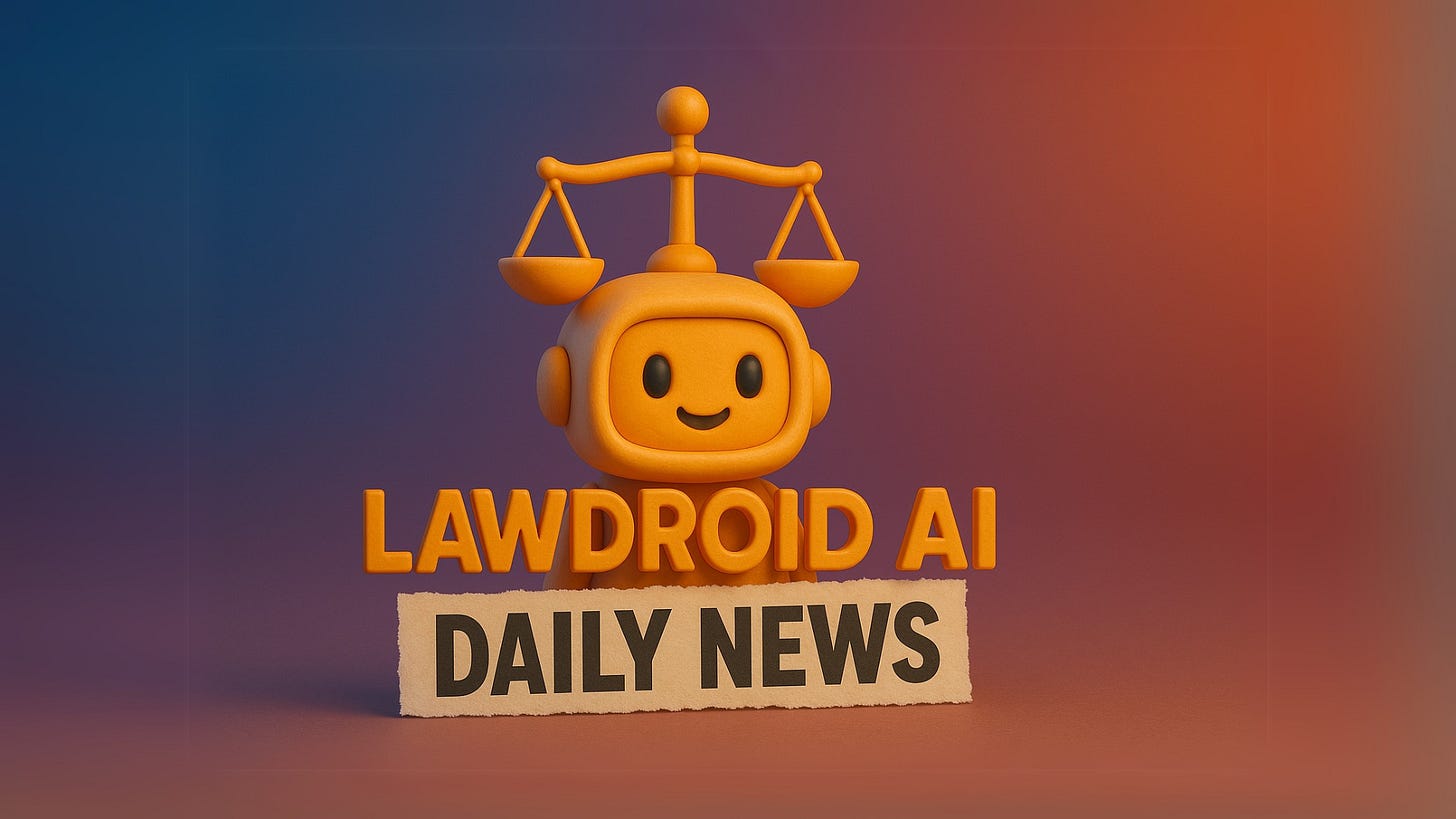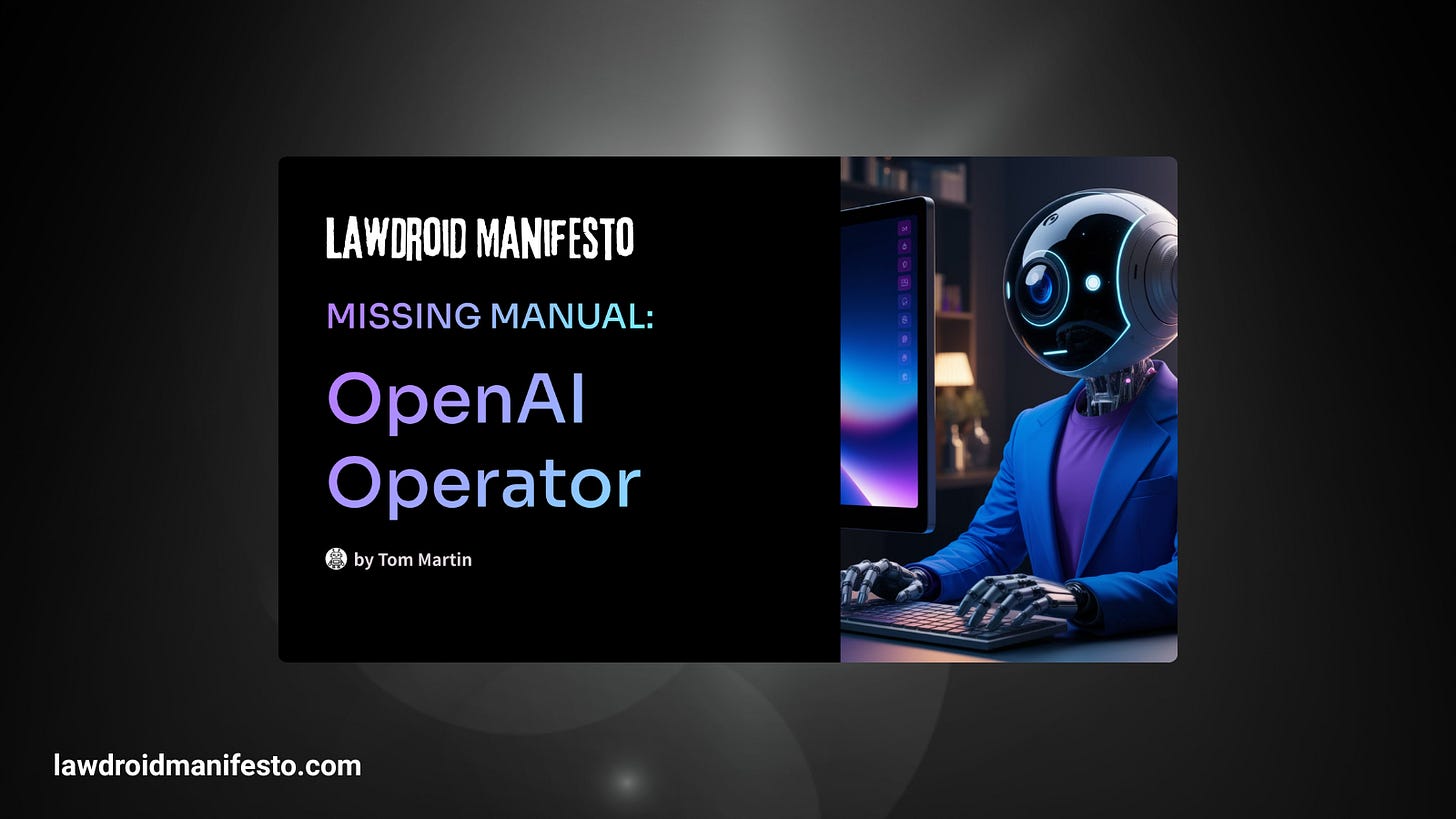Daily News: April 23, 2025
AI news that pops: daily insights, fast takes, and the future right in your inbox
Hey there friends👋! In today’s edition, you’re getting 5 🆕 news item and my take on what it all means. That’s it — delivered to your inbox, daily.
Subscribe to LawDroid Manifesto and don’t miss tomorrow’s edition:
LawDroid AI Daily News, is here to keep you up to date on the latest news items and analysis about where AI is going, from a local and global perspective. Please share this edition with your friends and colleagues and remember to tell me what you think in the comments below.
Today’s News
Here are the top 5 recent news items on artificial intelligence:
1. Trump Signs Executive Order to Advance AI Education for American Students
President Trump has issued an executive order establishing a comprehensive national initiative to enhance artificial intelligence (AI) education, aiming to ensure America's global leadership in AI technology. The order creates a White House Task Force on AI Education, mandates the establishment of a nationwide Presidential AI Challenge for students and educators, and emphasizes partnerships between industry, academia, and government agencies. Key provisions include prioritizing AI training for K-12 teachers, integrating AI into classrooms, expanding apprenticeships in AI fields, and ensuring lifelong AI skill development, positioning U.S. youth and educators at the forefront of an AI-driven future.
2. California State Bar Faces Backlash for Using AI-Generated Bar Exam Questions
The State Bar of California has admitted it used artificial intelligence (AI) to help create multiple-choice questions for its February 2025 bar exam, prompting widespread criticism from legal educators and test-takers. The State Bar revealed that 23 of the scored questions were developed with AI assistance through ACS Ventures, its contracted psychometrician, triggering concerns over conflicts of interest, validity, and fairness. Critics argue using AI and non-lawyer psychometricians compromised the quality of the exam, potentially disadvantaging test-takers, while the Bar maintains the questions were properly reviewed and reliable. The California Supreme Court, unaware of the AI involvement until now, has directed a return to traditional in-person testing for future exams.
3. OpenAI Plans Ambitious Return to Open-Source with New AI Model
OpenAI is preparing to launch its first openly available language model since GPT-2, targeting an early summer release. The model, spearheaded by VP of Research Aidan Clark, aims to outperform existing open reasoning models like Meta’s Llama and Google’s Gemma. Unlike rivals, OpenAI intends to provide this "text in, text out" model under a highly permissive license with minimal restrictions, hoping to attract developers and counter the rising popularity of competitors adopting open strategies, such as China’s DeepSeek. The company emphasizes it will thoroughly red-team and safety-test the model before release, addressing prior criticisms about rushed evaluations and opaque safety practices.
Source: https://techcrunch.com/2025/04/23/openai-seeks-to-make-its-upcoming-open-ai-model-best-in-class/
4. Microsoft envisions humans as ‘agent bosses’ managing AI coworkers
Microsoft's new Work Trend Index reveals a bold vision for AI in the workplace, positioning artificial intelligence not merely as tools but as autonomous team members managed by humans acting as “agent bosses.” According to the report, businesses will increasingly structure around human-AI teams working toward specific goals rather than traditional roles, requiring significant workforce retraining and new organizational approaches. Microsoft CEO Satya Nadella describes this evolution as “transformational,” suggesting it will fundamentally reshape job roles, create new AI-specific positions, and potentially lead to reductions in human headcount. The report, based on a survey of 31,000 workers globally, acknowledges challenges such as employee resistance, gaps in skills, and the risk of uneven distribution of AI benefits.
5. AI’s Surprising Evolution: From Productivity Tool to Personal Therapist and Life Coach
A recent Harvard Business Review study reveals a surprising trend: generative AI like ChatGPT is primarily being used for therapy, emotional support, and personal organization, rather than traditional technical tasks like coding or content creation. Users increasingly value AI's constant availability, privacy, and non-judgmental support, turning to it more for companionship and mental health guidance than for productivity purposes. This shift suggests a future where AI is less about replacing human jobs and more about enhancing human well-being, personal growth, and collaboration—potentially reshaping workplaces to prioritize mental health, continuous learning, and creative partnership between humans and AI.
Today’s Takeaway
These headlines highlight both exciting opportunities and serious red flags about how swiftly AI is reshaping society. Trump's AI education initiative is strategically wise, but risks prioritizing technological dominance over thoughtful, ethical AI literacy. California’s controversy over AI-generated bar exam questions vividly demonstrates the pitfalls of prematurely integrating AI into crucial processes without transparency or oversight. OpenAI's return to open-source signals potential progress toward community-driven AI innovation, provided they rigorously address safety concerns that previously tarnished their reputation. Microsoft's vision of AI as autonomous team members, managed by human "agent bosses," feels disturbingly impersonal and hints at profound workforce disruption. Yet, the trend of AI emerging as a trusted emotional companion rather than merely a productivity tool suggests genuine potential for enhancing human well-being, provided we carefully manage boundaries and avoid dependency. Ultimately, these stories underscore that while AI offers extraordinary promise, it also demands equally extraordinary caution, ethical oversight, and thoughtful leadership to ensure it enriches humanity rather than diminishes it.
Subscribe to LawDroid Manifesto
LawDroid Manifesto, your authentic source for analysis and news for your legal AI journey. Insightful articles and personal interviews of innovators at the intersection of AI and the law. Best of all, it’s free!
Subscribe today:
By the way, as a LawDroid Manifesto premium subscriber, you would get access to exclusive toolkits, like the Missing Manual: OpenAI Operator, coming out this month…
With these premium toolkits, you not only learn about the latest AI innovations and news items, but you get the playbook for how to use them to your advantage.
If you want to be at the front of the line to get first access to helpful guides like this, and have the inside track to use AI as a force multiplier in your work, upgrade to become a premium LawDroid Manifesto subscriber today!
I look forward to seeing you on the inside. ;)
Cheers,
Tom Martin
CEO and Founder, LawDroid




